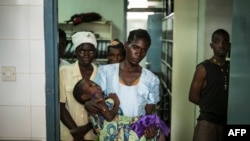In Malawi, public hospitals have started giving patients one meal a day instead of the recommended three. This is largely because of financial difficulties facing the health sector. But health rights campaigners say the move is hazardous to the lives of the patients.
The public hospitals have long been providing free meals to patients, three times a day; breakfast, lunch and supper.
Now this has changed. The patients are getting one meal at 4 o’clock in the afternoon to keep them for the next 24 hours.
“Some hospitals have started doing that because of the low levels of funding that we have at the moment. So we know there is that kind of ad hoc solution as they try to prioritize with the little funding that they have,” said the Ministry of Health spokesperson Adrian Chikumbe.
Families react
Local media reports say almost all district hospitals across the country have resorted to a one-meal-a-day menu.
Families of patients say the move is unwelcome.
Mariam M’dala, whose husband is at Chiradzulu district hospital in southern Malawi, says that after learning about the change on the menu, they tried to send messages to relatives back home to bring some food, but they don’t have enough food due to low yields this year.
M'dala says she sometimes relies on food brought by people who come to visit her sick husband or left over from other patients whose guardians themselves cook some food in the hospital kitchen.
Sometimes, she says, the patient sleeps on an empty stomach.
Chikumbe said that while the concerns are genuine, public hospitals are not necessarily meant to provide food to patients.
“Our primary responsibilities are to treat the patients. And this is why when things were okay; we were contracting out the catering services because it’s not our core function [to provide food],” said Chikumbe.
But he adds that the government is trying everything possible “to talk to partners for help.”
Juliana Lunguzi, the chairperson for the parliamentary committee on health, told VOA the food shortage situation in hospitals was expected.
“When we were doing the budget on the health sector, only 25 percent of the money that was required was appropriated for the health budget. And when the actual budget was given to the DHOs [district health officers], it was less that 50 percent of what was needed. So I am not surprised that we don’t have food in the hospitals,” said Lunguzi.
Patients at risk
Health rights activist Martha Kwataine told VOA the food rationing contradicts advice doctors give to patients.
“One would have expected that food is a priority because oftentimes when you go to the hospital the doctor would say ‘take this medication after a meal,’ because if you take medication on an empty belly it can be hazardous, some people develop ulcers, things of that nature,” she said.
Malawi's government has been struggling to fund its operations after donors who have long been contributing 40 percent to the national budget suspended aid in 2013 in the midst of the government corruption scandal.




